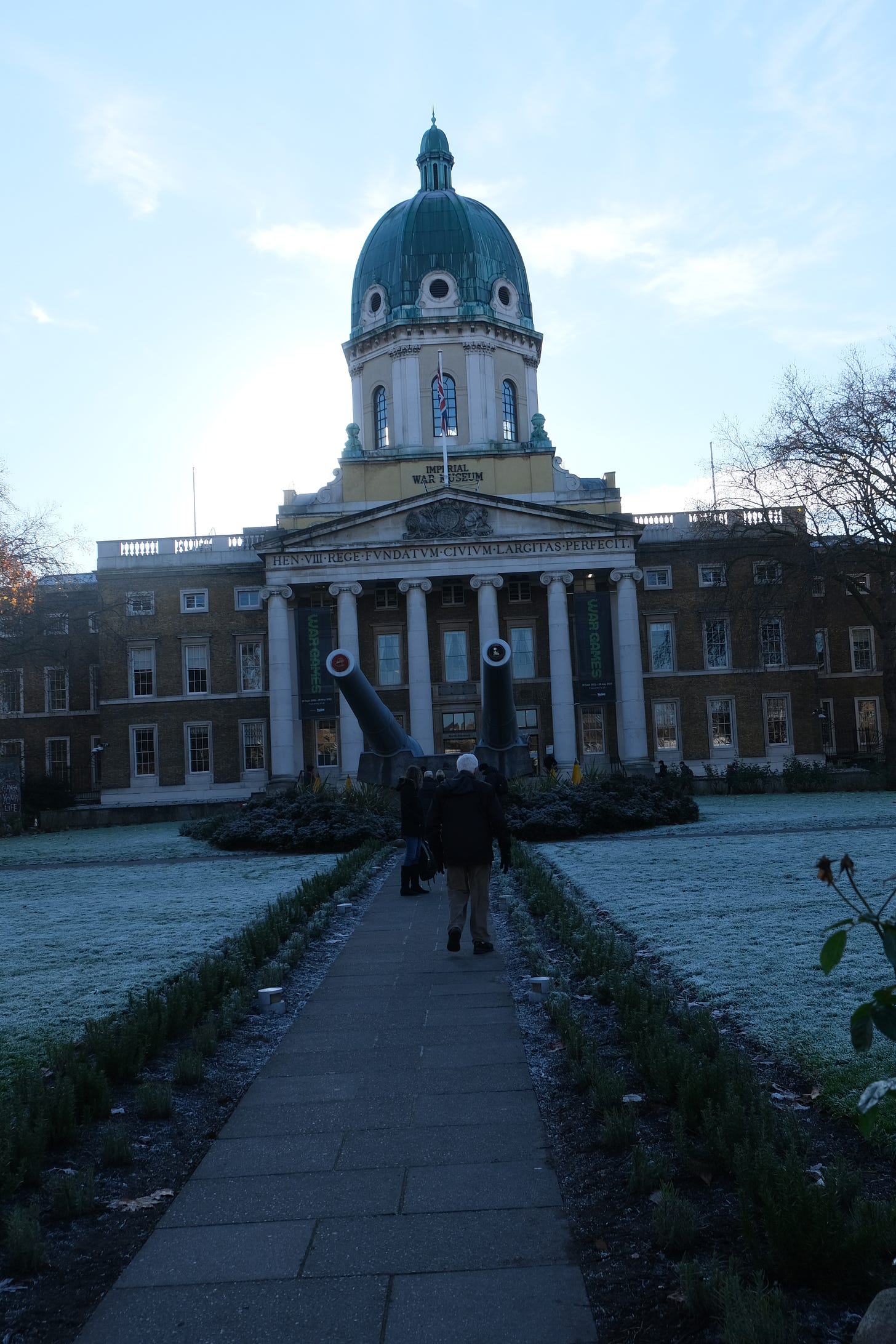London itself was lovely this morning with the crystal clear-blue sky and frigid cold temperatures. The aforementioned industrial actions sadly made Windsor and Canterbury too unpredictable so we chose the Imperial War Museum on the south bank as our destination.
.
I had been to the Imperial War Museum several years back but today’s visit somberly linked unwittingly to the headlines. The World War I exhibit drew me to ponder the assumptions that were so devastatingly wrong almost 110 years ago. They also made me question the depth of understanding in the United States about today’s assumptions on Taiwan and the implications of war with China.
The United States Congress approved a budget of $885billion this past week with many critics arguing we are not spending enough to arm or be prepared to defend Taiwan should the People’s Republic of China act to force the island to reunify with the mainland against the wishes of people on both sides of the Strait of Taiwan, really meaning the people in Taiwan.
I personally believe China’s leadership would go to war over a Taiwan that Beijing sees as seeking to separate itself permanently from the mainland. I think the people of Taiwan would prefer not to force the question of what they want but I also see pressure growing in some quarters for them to state they want that formal Declaration of Independence and associated US support for defense. I believe the People’s Republic leadership thinks these points are true as well. This raises the chances of a cataclysmic conflict between the United States and the People’s Republic of China substantially although few people actually publically advocate for war.
The lesson from today was held in the World War I exhibit. In 1914, Britain entered a conflict resulting from the assassination of ArchDuke Ferdinand in June. Germany invaded Britain’s ally Belgium in August. Not because Britain itself was under direct attack but it’s ally was threatened was the reason Britain went to war against the Central Powers that summer. The initial Wartime leader, Lord Kitchener, rallied support through volunteer recruits in 1914 to support the war on behalf of Belgium and against particularly Germany. The expectation was that the war would be decisively over quickly. After staggering losses resulted from combat directly against the Germans over two years, London forced conscription to meet its insatiable military needs after so much spending hundreds of thousands of lives and national treasure. Following four and a half years of repeated stalemate and horribly high death counts, there was no victory as expected but a weary stalemate couched as Germany’s total defeat with the conflict ending in November 1918. British society also changed fundamentally as did all of Europe.
The Taiwan scenario is worrying for the United States. Not even a formal ally after the United States broke diplomatic relations in 1979 to shift its recognition to Beijing, the United States might be called upon to fight a protracted conflict with China, another nuclear-armed state, a condition not true in World War I. Public support could dwindle relatively easily. Taiwan’s democracy is a most noble characteristic but how do we specifically call it it a national security interest for the United States? How would U.S. citizens view this as a protracted conflict for which they Wilber asked to sacrifice blood and treasure? What would be the length if a serious U.S. commitment to this? The people of Taiwan are admirable, industrious, and democrats but how will they keep Beijing away in perpetuity?
The lessons of World War I included reality that one war can lead to follow on conflict.
How much has the U.S. public thought through these steps? Are they will to sign on to a potentially civilization-altering war for the protection of a strangely contrived status? Do we know these answers? I left Kensington unsure of these answers except to be sure Britain has never been the same inside or out since it made a fateful choice based on some awkward assumptions. I only want to assure we have not made the mistake Britain did of not adequately examining assumptions on behalf of the greater society. FIN






All true, Doug, and I don’t have any pretensions that people I. The United States beyond the Beltway would be that knowledgeable about Taiwan. However, as wWI proved, escalation can become tremendous. Clausewitz warns that a nation should never get into a war unless it understands the nature of the conflict. That is where I worry—that we are willfully ignoring the ramifications or arrogantly thinking conflict with China would deter them on its face. We can’t have it both ways on the latter point: if indeed China’s modernisation is so much greater than we are comfortable with, then we should see it as an extremely dangerous contingency. If we are much more confident about our own status/capability, are we using China’s modernisation as a budget-driving device? Worst—do we have confidence i our assessment I. Either case?
My guess is that the US public, whether “Red” or “Blue” has no understanding of the war costs or consequences you mention. The assertion that America is bound to—or should volunteer to—go to war with China over Taiwan’s independence is a political football being tossed around among Americans who see such a war only as an abstraction, or believe, falsely, that such a war would be good for their own interests. The same could be said about Chinese advocates of taking control of Taiwan by military force. Across both time and culture, humans have an amazing capacity for self-deception about—here it is again—the consequences of their actions.